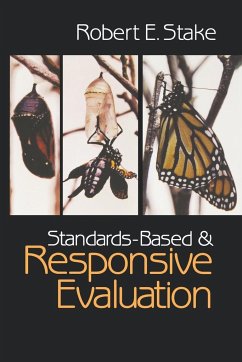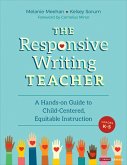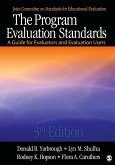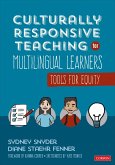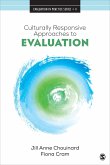- Broschiertes Buch
- Merkliste
- Auf die Merkliste
- Bewerten Bewerten
- Teilen
- Produkt teilen
- Produkterinnerung
- Produkterinnerung
Explores the many conceptual choices an evaluator needs to make - from attention to stakeholders, to weighing ethical risks, to writing a useful report - when doing an evaluation. This book presents evaluation as a series of choices for the reader.
Andere Kunden interessierten sich auch für
![Culturally Responsive Orientation and Mobility Standards Culturally Responsive Orientation and Mobility Standards]() Mary TellefsonCulturally Responsive Orientation and Mobility Standards26,99 €
Mary TellefsonCulturally Responsive Orientation and Mobility Standards26,99 €![The Responsive Writing Teacher, Grades K-5 The Responsive Writing Teacher, Grades K-5]() Melanie Meehan (Simsbury Public Schools)The Responsive Writing Teacher, Grades K-541,99 €
Melanie Meehan (Simsbury Public Schools)The Responsive Writing Teacher, Grades K-541,99 €![Responsive Collaboration for IEP and 504 Teams Responsive Collaboration for IEP and 504 Teams]() Albert Johnson-Mussad (Educational consultant and coach)Responsive Collaboration for IEP and 504 Teams45,99 €
Albert Johnson-Mussad (Educational consultant and coach)Responsive Collaboration for IEP and 504 Teams45,99 €![The Program Evaluation Standards The Program Evaluation Standards]() Donald B. YarbroughThe Program Evaluation Standards88,99 €
Donald B. YarbroughThe Program Evaluation Standards88,99 €![Culturally Responsive Teaching Online and In Person Culturally Responsive Teaching Online and In Person]() Stephanie Smith BudhaiCulturally Responsive Teaching Online and In Person39,99 €
Stephanie Smith BudhaiCulturally Responsive Teaching Online and In Person39,99 €![Culturally Responsive Teaching for Multilingual Learners Culturally Responsive Teaching for Multilingual Learners]() Sydney Cail Snyder (SupportEd)Culturally Responsive Teaching for Multilingual Learners45,99 €
Sydney Cail Snyder (SupportEd)Culturally Responsive Teaching for Multilingual Learners45,99 €![Culturally Responsive Approaches to Evaluation Culturally Responsive Approaches to Evaluation]() jill ChouinardCulturally Responsive Approaches to Evaluation54,99 €
jill ChouinardCulturally Responsive Approaches to Evaluation54,99 €-
-
-
Explores the many conceptual choices an evaluator needs to make - from attention to stakeholders, to weighing ethical risks, to writing a useful report - when doing an evaluation. This book presents evaluation as a series of choices for the reader.
Produktdetails
- Produktdetails
- Verlag: SAGE Publications Inc
- Seitenzahl: 364
- Erscheinungstermin: 1. Januar 2004
- Englisch
- Abmessung: 234mm x 156mm x 20mm
- Gewicht: 582g
- ISBN-13: 9780761926658
- ISBN-10: 0761926658
- Artikelnr.: 21840319
- Herstellerkennzeichnung
- Libri GmbH
- Europaallee 1
- 36244 Bad Hersfeld
- gpsr@libri.de
- Verlag: SAGE Publications Inc
- Seitenzahl: 364
- Erscheinungstermin: 1. Januar 2004
- Englisch
- Abmessung: 234mm x 156mm x 20mm
- Gewicht: 582g
- ISBN-13: 9780761926658
- ISBN-10: 0761926658
- Artikelnr.: 21840319
- Herstellerkennzeichnung
- Libri GmbH
- Europaallee 1
- 36244 Bad Hersfeld
- gpsr@libri.de
Professor Stake received his B.A. in Mathematics with a minor in naval science and Spanish from the University of Nebraska in 1950. He graduated with an M.A. in educational psychology in 1954 from this university. In 1958, he received his Ph.D. in psychology from Princeton University. From 1955 to 1958, he was a Psychometric Fellow at the Educational Testing Service. Then, an Associate Professor and Faculty Research Coordinator of the College of Education at the University of Nebraska at Lincoln. In 1963, he arrived at the University of Illinois at Urbana-Champaign where he assisted Thomas Hastings, Lee Cronbach, and Jack Easley in the creation of the new evaluation center, CIRCE, and in developing a program of research on program evaluation. He also became the Associate Director of the Statewide High School Testing Program. In 1975, he became director of CIRCE. He has been active in the program evaluation profession and has promoted an approach to evaluation methods called "responsive evaluation." He took up a qualitative perspective, particularly case study methods, in order to represent the personal experience and complexity of evaluation study. He received the Lazerfeld Award from the American Evaluation Association and an honorary doctorate from the University of Uppsala.
First Words
1. Criterial and Interpretive Evaluation
The Ubiquitous Search For Quality
Standards
Criterial and Episodic Thinking
Roles and Styles of Evaluation
Formative and Summative Evaluation
The Evaluand
The Evaluator
2. Roles, Models, and Dispositions
Models
Dispositions
Roles
3. Standards-Based Evaluation
Standards-Based
Bias
Factors
Criteria and Standards for Comparisons
Needs Assessment
Goals
Costs
Representations of Performance
What Goes Wrong
4. Responsive Evaluation
Issues as Conceptual Structure
Observations and Judgments
Perceptions
Combining Responsive and Standards-Based Evaluation
Experience as Knowledge
Organizing and Reporting
Procedures
What Goes Wrong
5. Data Gathering
Choosing Data Sources
Instrumentation
Recipient Responses
Staff and Management Responses
Stakeholder and Public Responses
Data Coding and Records Processing
Surveys
Observation Schedules
Interviewing
Histories and Artifacts
6. Analysis, Synthesis, and Meta-evaluation
Analysis
Synthesis
Experiential and Probative Inferences
Meta-evaluation
An Ethic of Continuous Self-Challenge
7.Clients, Stakeholders, Beneficiaries and Readers
Participatory Evaluation
Stakeholding
Utilization
Democratic Evaluation
Negotiation of a Contract
Writing Reports
Styles of Reporting
Representations of the Evaluand
Names and Labels
Cutting Edge
Offering Recommendations
8. Issues Needing Interpretation
Complexity
Program Standardization
Program Fairness
Staff Development
9. Evidence-Based Evaluation
Is Evaluation Science?
Petite and Grand Generalizations
Policy Evaluation
Bias
Skepticism as a Commitment
10. Doing It Right
Quality Work Is Ethical Work
Personal Standards
Professional Standards
Human Subjects Protection
Confidentiality and Anonymity
The Business of Evaluation
Personnel Evaluation
Product Evaluation
Political and Cultural Contexts
Last Words
References
Bibliography
Index
About the Author
1. Criterial and Interpretive Evaluation
The Ubiquitous Search For Quality
Standards
Criterial and Episodic Thinking
Roles and Styles of Evaluation
Formative and Summative Evaluation
The Evaluand
The Evaluator
2. Roles, Models, and Dispositions
Models
Dispositions
Roles
3. Standards-Based Evaluation
Standards-Based
Bias
Factors
Criteria and Standards for Comparisons
Needs Assessment
Goals
Costs
Representations of Performance
What Goes Wrong
4. Responsive Evaluation
Issues as Conceptual Structure
Observations and Judgments
Perceptions
Combining Responsive and Standards-Based Evaluation
Experience as Knowledge
Organizing and Reporting
Procedures
What Goes Wrong
5. Data Gathering
Choosing Data Sources
Instrumentation
Recipient Responses
Staff and Management Responses
Stakeholder and Public Responses
Data Coding and Records Processing
Surveys
Observation Schedules
Interviewing
Histories and Artifacts
6. Analysis, Synthesis, and Meta-evaluation
Analysis
Synthesis
Experiential and Probative Inferences
Meta-evaluation
An Ethic of Continuous Self-Challenge
7.Clients, Stakeholders, Beneficiaries and Readers
Participatory Evaluation
Stakeholding
Utilization
Democratic Evaluation
Negotiation of a Contract
Writing Reports
Styles of Reporting
Representations of the Evaluand
Names and Labels
Cutting Edge
Offering Recommendations
8. Issues Needing Interpretation
Complexity
Program Standardization
Program Fairness
Staff Development
9. Evidence-Based Evaluation
Is Evaluation Science?
Petite and Grand Generalizations
Policy Evaluation
Bias
Skepticism as a Commitment
10. Doing It Right
Quality Work Is Ethical Work
Personal Standards
Professional Standards
Human Subjects Protection
Confidentiality and Anonymity
The Business of Evaluation
Personnel Evaluation
Product Evaluation
Political and Cultural Contexts
Last Words
References
Bibliography
Index
About the Author
First Words
1. Criterial and Interpretive Evaluation
The Ubiquitous Search For Quality
Standards
Criterial and Episodic Thinking
Roles and Styles of Evaluation
Formative and Summative Evaluation
The Evaluand
The Evaluator
2. Roles, Models, and Dispositions
Models
Dispositions
Roles
3. Standards-Based Evaluation
Standards-Based
Bias
Factors
Criteria and Standards for Comparisons
Needs Assessment
Goals
Costs
Representations of Performance
What Goes Wrong
4. Responsive Evaluation
Issues as Conceptual Structure
Observations and Judgments
Perceptions
Combining Responsive and Standards-Based Evaluation
Experience as Knowledge
Organizing and Reporting
Procedures
What Goes Wrong
5. Data Gathering
Choosing Data Sources
Instrumentation
Recipient Responses
Staff and Management Responses
Stakeholder and Public Responses
Data Coding and Records Processing
Surveys
Observation Schedules
Interviewing
Histories and Artifacts
6. Analysis, Synthesis, and Meta-evaluation
Analysis
Synthesis
Experiential and Probative Inferences
Meta-evaluation
An Ethic of Continuous Self-Challenge
7.Clients, Stakeholders, Beneficiaries and Readers
Participatory Evaluation
Stakeholding
Utilization
Democratic Evaluation
Negotiation of a Contract
Writing Reports
Styles of Reporting
Representations of the Evaluand
Names and Labels
Cutting Edge
Offering Recommendations
8. Issues Needing Interpretation
Complexity
Program Standardization
Program Fairness
Staff Development
9. Evidence-Based Evaluation
Is Evaluation Science?
Petite and Grand Generalizations
Policy Evaluation
Bias
Skepticism as a Commitment
10. Doing It Right
Quality Work Is Ethical Work
Personal Standards
Professional Standards
Human Subjects Protection
Confidentiality and Anonymity
The Business of Evaluation
Personnel Evaluation
Product Evaluation
Political and Cultural Contexts
Last Words
References
Bibliography
Index
About the Author
1. Criterial and Interpretive Evaluation
The Ubiquitous Search For Quality
Standards
Criterial and Episodic Thinking
Roles and Styles of Evaluation
Formative and Summative Evaluation
The Evaluand
The Evaluator
2. Roles, Models, and Dispositions
Models
Dispositions
Roles
3. Standards-Based Evaluation
Standards-Based
Bias
Factors
Criteria and Standards for Comparisons
Needs Assessment
Goals
Costs
Representations of Performance
What Goes Wrong
4. Responsive Evaluation
Issues as Conceptual Structure
Observations and Judgments
Perceptions
Combining Responsive and Standards-Based Evaluation
Experience as Knowledge
Organizing and Reporting
Procedures
What Goes Wrong
5. Data Gathering
Choosing Data Sources
Instrumentation
Recipient Responses
Staff and Management Responses
Stakeholder and Public Responses
Data Coding and Records Processing
Surveys
Observation Schedules
Interviewing
Histories and Artifacts
6. Analysis, Synthesis, and Meta-evaluation
Analysis
Synthesis
Experiential and Probative Inferences
Meta-evaluation
An Ethic of Continuous Self-Challenge
7.Clients, Stakeholders, Beneficiaries and Readers
Participatory Evaluation
Stakeholding
Utilization
Democratic Evaluation
Negotiation of a Contract
Writing Reports
Styles of Reporting
Representations of the Evaluand
Names and Labels
Cutting Edge
Offering Recommendations
8. Issues Needing Interpretation
Complexity
Program Standardization
Program Fairness
Staff Development
9. Evidence-Based Evaluation
Is Evaluation Science?
Petite and Grand Generalizations
Policy Evaluation
Bias
Skepticism as a Commitment
10. Doing It Right
Quality Work Is Ethical Work
Personal Standards
Professional Standards
Human Subjects Protection
Confidentiality and Anonymity
The Business of Evaluation
Personnel Evaluation
Product Evaluation
Political and Cultural Contexts
Last Words
References
Bibliography
Index
About the Author

